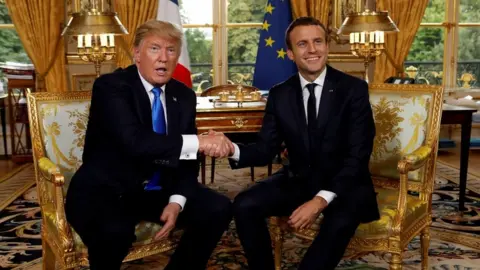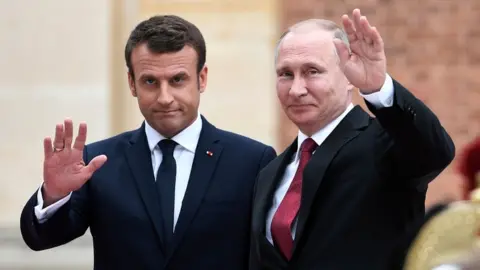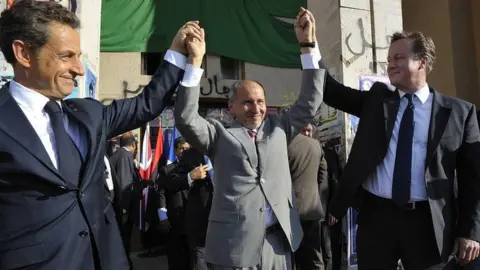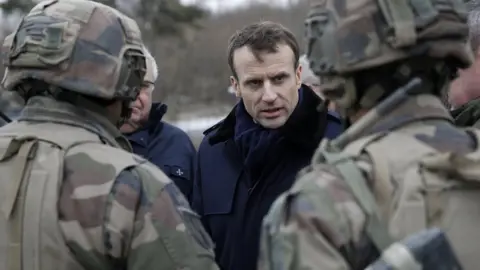Syria: What can Emmanuel Macron and Donald Trump do?
 Reuters
ReutersEmmanuel Macron says he and his allies will decide on a response to the presumed chemical weapon attack in Syria "at a time of our choosing". With the French president now talking daily to his American counterpart, Donald Trump, what role is France likely to play in any international response?
A year ago, Russian President Vladimir Putin stood grim-faced in the opulence of France's Versailles Palace, as a newly-elected President Macron announced that the use of chemical weapons in Syria was a "red line" for France, and "would result in reprisal and an immediate response".
Now Mr Macron - who likes to be seen as a president who keeps his word - is facing the test of what "reprisal" actually means.
Benjamin Hautecouverture, from France's Foundation for Strategic Research, says Mr Macron could still choose to respond diplomatically, "by persuading Moscow to ban its Syrian ally from using chemical weapons again".
But former US President Barack Obama was derided in France for not following through on his own "red line" after Syrian attacks five years ago - and Mr Macron is keen not to suffer the same criticism.
"When you fix red lines," he told a French newspaper last year, "if you can't enforce them, you decide to be weak."
Strength is an important part of Mr Macron's bid to project French influence on the world stage - and a key element, too, of his new political friendship with his US counterpart, Donald Trump.
"Macron is one of the few European leaders - even world leaders - who understand how to handle Trump," says French journalist Philippe Labro. "France has proved to Trump and his boys in the State Department that this is a country that's waking up again, with a strong president - and Trump is impressed by strong people.
"Trump sees our work in Africa and how we deal with conflicts. He knows we have planes in the Middle East ready to strike."
 Getty Images
Getty ImagesFrom the first time they met, the young French leader was keen to establish a relationship of equals with his US counterpart, showing that he could match Mr Trump's handshake, if not his military capabilities.
Now, Mr Macron says, the two men speak "every day", and few here believe that France would choose to carry out military action in Syria alone.
But Joseph Downing, a specialist in Franco-US relations at the London School of Economics, says France will need to swallow the role of junior partner.
"[Their] close military co-operation will not be a 50/50 balance," he says. "France is playing the role that Britain did in the Iraq invasion; they're a symbolic partner for the US to say it's not acting alone."
Former French general Dominique Trinquand says it wouldn't make sense for France to act without its allies, and that they would likely share out targets.
"They could hit a number of airbases in Syria, which would send a punitive message to [Syrian President] Bashar [al-Assad]," he says. "Or they could launch a greater operation, aimed at destabilising the regime."
 Getty Images
Getty ImagesMr Macron has said France could target stockpiles of chemical weapons in Syria but, Mr Hautecouverture says, such targets may not be plentiful, or easy to find.
"All the declared stockpiles have already been dismantled," he explains. "And when the regime is using chlorine, it's totally useless because you have chlorine everywhere.
"The message needs to deter the Syrian president from using chemical weapons in future; so the targets could be aeroplanes, helicopters, airports, command centres, or even [locations] very close to the physical person of Assad."
Whatever targets may be discussed with his allies, Mr Macron is likely to be wary of a deeper strategic campaign in Syria. His wish to project French power is coupled with an unwillingness to repeat what he sees as mistakes made by his predecessors in Libya.
 EPA
EPA"I don't want a failed state," he said last year. "France didn't take part in the Iraq war and that was right. And France was wrong to take part in the war in Libya in the way it did.
"What was the result of those interventions? Failed states where terrorist groups prospered. I don't want that in Syria."
Dr Downing says Mr Macron is facing a "delicate balance to castrate the regime but not topple it".
"He's trying to create an imperialistic image of his presidency," Dr Downing says, "but he doesn't want to be seen as going in alongside Trump and creating a bigger problem [in Syria]. He doesn't want to worsen the migrant crisis or increase the threat of jihadist attacks at home."
Mr Hautecouverture agrees. "The French population has not been prepared for a long-term strategic campaign," he said. "This is not the beginning of a war."
